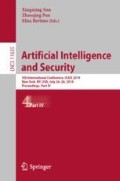Abstract
Since software evolution has become ineluctable for many trusted systems, the research works in this paper will be focused on a hot topic in the present trusted software researches-key theories and technologies of component-based trusted software evolution. In this paper, we analysed the evolution of trusted software architecture on the basis of the characteristics of trusted component, and proposed the cohesion-based trusted component decomposition algorithm on the basis of trusted component description and modelling based on OR-transit Petri Net in our previous works.
Access this chapter
Tax calculation will be finalised at checkout
Purchases are for personal use only
References
Liu, K., Shan, Z., Wang, J., He, J., Zhang, Z., Qin, Y.: Overview on major research plan of trustworthy software. China Science Fund. 22(3), 145–151 (2008)
Tokuda, L., Batory, D.: Automating three modes of evolution for object-oriented software architectures. In: Proceedings of COOTS 1999, San Diego, pp. 189–202 (1999)
Yu, Y., Li, T., Liu, Q., Dai, F., Zhao, N.: OR-transition colored Petri Net and its application in modeling software system. In: Proceedings of 2009 International Workshop on Knowledge Discovery and Data Mining, Moscow, Russia, January 2009, pp. 15–18 (2009)
Zhang, C., Cui, G., Liu, H.W., Meng, F.C.: Component-based software reliability process technologies. Chin. J. Comput. 37(12), 2586–2612 (2014)
Tian, J., Han, J., Du, R., Wang, Y.: Creditability evaluation model based on software behavior trace. J. Comput. Res. Dev. 49(7), 1514–1524 (2012)
Li, Z., Tian, J., Yang, X.: Dynamic trustworthiness evaluation model of software based on checkpoint’s classification attributes. J. Comput. Res. Dev. 50(11), 2397–2405 (2013)
Cui, J., Zhang, Y., Cai, Z., Liu, A., Li, Y.: Securing display path for security-sensitive applications on mobile devices. CMC: Comput. Mater. Continua 55(1), 017–035 (2018)
Franco, J.M., Barbosa, R., Zenha-Rela, M.: Reliability analysis of software architecture evolution. In: Sixth Latin-American Symposium on Dependable Computing (LADC), Rio de Janeiro, Brazil, pp. 11–20 (2013)
Rathod, H., Parmar, M.: Study of genetic approach in estimating reliability of component based software. PARIPEX - Indian J. Res. 1(11), 17–19 (2012)
Shanmugapriya, P., Suresh, R.M.: Software architecture evaluation methods – a survey. Int. J. Comput. Appl. 49(16), 19–26 (2012)
Wang, J., Chen, W.R.: A reliability-oriented evolution method of software architecture based on contribution degree of component. J. Softw. 7(8), 1744–1750 (2012)
Zhan, D., Feng, J., Nie, L., Xu, X.F.: Construction approach of confidence management software based on layered verification. J. Harbin Inst. Technol. 44(5), 75–80 (2012)
Li, Q.Y., Li, H.F., Wang, G.D.: Sensitivity analysis on the influence factors of software reliability based on diagnosis reasoning. Adv. Intell. Syst. Comput. 180, 557–566 (2013)
Liu, Y.P., Xu, C., Cheung, S.C.: Diagnosing energy efficiency and performance for mobile internetware applications. IEEE Softw. 32(1), 67–75 (2015)
Yue, Y.: Multi-factor decision making for software reliability evaluation. Appl. Res. Comput. 32(4), 1110–1113 (2015)
Yang, H.J., Zheng, S.: Software evolution for moving into and moving within internetware paradigm. Int. J. Softw. Inform. 7(1), 41–61 (2013)
Jia, Y.H., Zheng, S.: Software evolution based on service-oriented requirement in internetware. In: 4th International Conference on Computer Research and Development, IACSIT Press, Singapore, pp. 20–25 (2012)
Panwar, P., Garg, A.: Analysis of reliability and cost tradeoffs in architecture based software applications using a genetic algorithm. Int. J. Comput. Appl. 72(1), 33–37 (2013)
Secure Software, Inc.: The CLASP Application Security Process (2005). http://www.ida.liu.se/~TDDC90/papers/clasp_external.pdf
Chargo, J.T.: Automated software architecture extraction using graph-based clustering. Graduate thesis and dissertations, Iowa State University (2013)
SecureChange Project (2009–2012). http://www.securechange.eu/
Xu, J., Si, G., Yang, J., Wen, S., Zhang, B.: An internetware dependable entity model and trust measurement based on evaluation. Chin. Sci. Inf. Sci. 43(1), 108–125 (2013)
Kumar, P.S., Karsai, G.: Integrated analysis of temporal behavior of component-based distributed real-time embedded systems. In: International Symposium on Object Component Service Oriented Real Time Distributed Computing, pp. 50–57 (2015)
Liu, J., Liu, L.: A coloured Petri Net approach to the functional and performance analysis of SIP Non-INVITE transaction. In: Koutny, M., Haddad, S., Yakovlev, A. (eds.) Transactions on Petri Nets and Other Models of Concurrency IX. LNCS, vol. 8910, pp. 147–177. Springer, Heidelberg (2014). https://doi.org/10.1007/978-3-662-45730-6_8
Long, S.: Analysis of concurrent security protocols using colored Petri Nets. In: International Conference on Networking, pp. 227–230 (2009)
Han, W., Tian, Z., Huang, Z., Li, S., Jia, Y.: Bidirectional self-adaptive resampling in imbalanced big data learning (2018). Multimedia Tools Appl. https://doi.org/10.1007/s11042-018-6938-9
Choosang, S., Gordon, S.R.: A coloured Petri Net methodology and library for security analysis of network protocols. J. Comput. 9(2), 243–256 (2014)
Xie, X., Yuan, T., Zhou, X., Cheng, X.: Research on trust model in container-based cloud service. CMC: Comput. Mater. Continua 56(2), 273–283 (2018)
Acknowledgments
This work has been supported by the National Science Foundation of China under Grant (No. 61462091, U1803263, 61672020, 61866039), by the Data Driven Software Engineering innovation team of Yunnan province No. 2017HC012, by the Science Foundation of Key Laboratory in Software Engineering of Yunnan Province under Grant No. 2017SE205, by the eighteenth batch of Yunnan Province in the young academic and technical leaders reserve personnel training project under Grant No. C614300.
Author information
Authors and Affiliations
Corresponding authors
Editor information
Editors and Affiliations
Rights and permissions
Copyright information
© 2019 Springer Nature Switzerland AG
About this paper
Cite this paper
Zhao, N., Cao, M., Song, C., Shi, S., Yu, Y., Li, S. (2019). Trusted Component Decomposition Based on OR-Transition Colored Petri Net. In: Sun, X., Pan, Z., Bertino, E. (eds) Artificial Intelligence and Security. ICAIS 2019. Lecture Notes in Computer Science(), vol 11635. Springer, Cham. https://doi.org/10.1007/978-3-030-24268-8_41
Download citation
DOI: https://doi.org/10.1007/978-3-030-24268-8_41
Published:
Publisher Name: Springer, Cham
Print ISBN: 978-3-030-24267-1
Online ISBN: 978-3-030-24268-8
eBook Packages: Computer ScienceComputer Science (R0)

